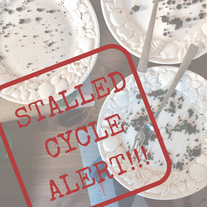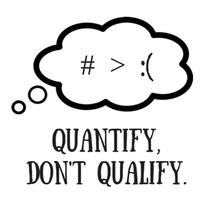 How's your living space feel lately? Cozy? Comfortable? More importantly, how do you feel when you think about your living space? Overwhelmed? Frustrated? Embarrassed? Ashamed? Even if it's not a client's primary issue, when I hear someone struggling with their house I ask questions because our homes so deeply affect the way we feel. There are shelves upon tidy shelves of books about how to keep house and I'm not about to dive into that arena no matter how fascinating, but there is one idea I return to often that seems to help. I call it "completing the cycle." I first came up with this idea when I was reading the book Home Comforts by Cheryl Mendelson. It's huge and it covers everything from how to iron to what bacteria in your kitchen can kill you (eek!). My favorite part is the very first chapter in which she talks about how the best-feeling homes run on routines and rhythms that keep necessities and comforts in abundance. For her, these routines are the ultimate self-care. Routines and rhythms, I realized, are rooted in cycles. (Yes, there are way more than just housekeeping cycles, but we'll stick with those for now.) There's the laundry or dirty dishes kind of cycle: clean stuff gets dirty, we clean it, put it away, and start again. Or the food cycle: we buy it, prepare it, eat, it, buy some more. Or you can mash up those cycles and call it dinner. Once you look around, you can see lots of cycles, like bills, beds, lawns, toys, library books, carpets ... and you can see all the places those cycles have stalled out. The laundry cycle that stopped on the couch. The dish cycle that stopped in the sink. The cup-of-tea cycle that stalled with the tea envelope on the counter. Most of the mess in our houses is from stalled out cycles. There are lots of things about these cycles that we can control (like content - take out or cooking?) but for the purposes of this discussion, the most important is duration. It's pretty simple. Short cycles are usually tidier, long cycles are messier. A short cycle means cleaning up dinner that night. A long cycle means days of dishes in the sink (yes, this could also be considered "batch processing," very efficient!). If you look around and your house (or your life, for that matter) feels out of control, some of it is probably stalled cycles. When you can see that, cleaning becomes easier - you can pick just one cycle to finish up instead of feeling overwhelmed by the whole mess. And eventually you can start to think about completing cycles when you're in them or, even better, when you start them! That makes things feel a lot easier because you can be deliberate about stopping mid-cycle - we've all had nights when we're too tired to clean the kitchen. And if that's the case, you can go to bed without guilt and pick up again where you left off when you can. If you're mindful of your cycles, you're in control of them, not the other way around. Keeping up with cycles (at least mostly) might seem like more work but here are some things to keep in mind. 1) You're going to finish them eventually, so why not right away if you have time? 2) It doesn't actually save energy to do them later - you still have to do them (unless you get someone else to do them for you!). 3) Finishing something up makes it easy to start again anytime. And 4) You get a reward: necessities and comforts in abundance. Which, for me, at least, means feeling cozy at home AND having a whole bunch of things crossed off your Tracking List. Awesome.
1 Comment
 Have you ever decided to get to work on something and then decided it would be too hard, take too long or be or too upsetting? Sometimes this happens because you're tired, hungry, frustrated or over-caffeinated but sometimes it's because you have a very bad story in your head about what you have to do. If this happens to you, try quantifying, not qualifying. Turn it into a simpler task by focusing on the simple mechanics of it and taking away the story you're telling in your head. First, ask yourself, "What's so BAD about this?" What's the drama about?! Have you ever wanted to ask a five year old WHY ON EARTH she's sobbing on the floor of the grocery store?! (I have...) If it helps, see yourself as that five your old and ask, "Seriously! What's the drama?!" (But try to actually answer instead of sobbing uncontrollably or throwing your shoes at the ceiling.) Here's an example. I had a client who hated to wash dishes. Every time she looked at her dirty dishes she felt overwhelmed and frustrated. When she asked herself, "What's the drama here?" she realized the dishes reminded her of all the ways she felt like she was a terrible, total, unredeemable failure of a housekeeper, completely incapable of accomplishing anything domestic. Ever. She realized it wasn't the dishes, it was the shame she had around housekeeping that stopped her. The shame was pretty big. Second, ask yourself, "If I broke this down into simple minutes/items/mechanics how long/what would it take?" Break it down into anything quantifiable, unemotional. This works especially well for small tasks like dishwashing: "Three bowls, four mugs, three forks, ten spoons, a whisk and a frying pan." It works for bigger tasks, too, like a presentation, but it's about making the steps as small and simple as possible so you can get started, like, "Turn on the computer, open a word document, take out notes from meeting about presentation, read notes, list topics..." I could go on, but you get the point. When most people do this, they feel better because tasks are more manageable. The client who hated washing dishes found herself saying, "Get over this! It'll take eight minutes!" She timed it, and yeah, it was eight. Eight minutes of work equalled a small course correction with significant long term impact on her attitude about housekeeping. Since then she's gotten curious about how long other things take. Mowing the lawn: 22 minutes, putting in laundry: five minutes, and the list goes on. All of that is so much more manageable. Take away the story. It's so much easier to do things when they're just ... things.  Anxiety can wreak havoc in so many ways, especially at work. It can affect the quality and quantity of your work as well as the impression you give to your colleagues. It can show up in sneaky ways ranging from self doubt and under-performance to excessive control and over-performance. Either will get in the way of doing your best work, and once it’s done working you over at work, it’ll trash your work life balance.. But don’t panic! With a shift in perspective you can reframe your anxiety so you and your work (and your life) can benefit. Anxiety-rooted under-performance and over-performance share one big idea. (Actually, a lot of ideas, but some of them are a little too big to go into here, like “Am I worthwhile as a human being?” “Will I ever be good enough?” Yes, but if you don’t believe that, this blogpost isn’t going to be the thing to change your mind…) The one idea that we'll tackle here is the belief that mistakes are bad. This is … a mistake. Let’s look at this in more detail. If you break it down, the fear of making a mistake can show up in several different delusions, such as the following:
Let’s tackle this backwards. Look at your colleagues. Who are the best performers? The happiest and most enthusiastic workers? The most accomplished team members? Now think about how they handle mistakes. Do they flush with shame when they make a mistake? Do they hide their mistakes or avoid working to avoid making mistakes? Do they throw other people under the bus when they make a mistake? Okay, maybe some of them do that but those people aren’t the role models we’re looking for here. The people we’re looking for work hard, they make plenty mistakes, they own them and they move on. How do they do that?? They have a different understanding about mistakes. And not just their mistakes but other people’s mistakes, too. This is what we're going for, and these are some of the things we need to remember to get there: Work = Mistakes Mistakes are inevitable. Everyone makes mistakes and working hard is impossible without making mistakes. They go hand in hand, so anticipate it and be proactive about it. Mistakes + Responsibility = Success Reputations are not ruined by mistakes - they’re ruined by not taking responsibility for mistakes. And, contrary to what we may all think, people are mostly focusing on themselves, not on you. Intelligence = Mistakes The idea that intelligence means always being "right" is wrong. Intelligence means having an open mind, being willing to think and work hard and get things wrong sometimes. Mistakes can be hugely beneficial learning experiences, like for the guy who invented post-it notes by dripping goo on his shoe (or however that story goes). Or they can just be embarrassing (like for me when I forgot to take the lines meant to indicate “this is a ramp” off a construction drawing and they ended up being scored into the pavement.). But they’re part of life. And I'm still pretty smart despite that error, which is now, for all intents and purposes, etched in stone. Intelligence = Questions Asking questions is not a sign of weakness. Sometimes we have no idea what’s going on, but we think everyone else does, so we keep our mouths shut so we don't look stupid. If you really should know what's going on and are clueless due to your own negligence, then by all means, keeps your mouth shut and look like you’re thinking really hard. But if not, just ask. Chances are you’re not the only person with that question and the longer you wait to ask, the deeper the hole you're digging. Smart people readily admit their ignorance. Dumb people hide it. Side note, the best time to ask questions is when you’re new - new to a job or new to a project. At that point, you’re not supposed to know anything anyway, so just go ahead and ask a ton of questions. And write down the answers. Writing things down - always a good move. Those are my top four tips for handling mistakes at work. And by handling, I mean, “not avoiding.” Avoiding mistakes means avoiding getting anything done. Or, alternately, getting too much done - working, working, working, even doing other people’s work beyond perfection to avoid mistakes. Which brings me to one more point: other people’s mistakes. Other People's Mistakes How you handle other people’s mistakes is a good indication of how you feel about your own mistakes. When someone you work with makes a mistake (for example, maybe she checked presentation boards on her flight to Chicago for an important meeting with the Board of Trustees at a prominent University and the airline lost the boards and didn't find them in time for said meeting…ahem), what would you say to her? Maybe you’re the kind of person (like a certain awesome Cathy I know) who would (did) say something like, “Oh &%$#, that must have totally sucked - I’m so sorry! I’ll bet you figured out a great way to handle it, though.” Or would you look at that person and say, “Sucks to be you!”? No, you would not (at least I hope not if you’re reading this blog.) Ideally, we would say the same things to ourselves that we would say to others - kind, supportive things that encourage that person to move on - and remember to never check presentation boards again… However, you may have enough social skills to know to say those things but at the same time be thinking something else, and that something else is what’s going to tell you how YOU feel about YOUR mistakes. Are you thinking inside, “Oh my god - how could she have let that happen?? She’s so careless. I would never, ever, ever have let that happen in a million years.” Followed quickly by an entry of “NEVER CHECK PRESENTATION BOARDS” on your “How to Be the BEST at Work” Excel spreadsheet. These people are so afraid of mistakes they can’t stop working to avoid them. These people try to control everything they can to avoid mistakes. And yes, they often do avoid them, but they work so hard they’re exhausted. They may look good, but they're operating out of fear. Alternately, you may feel paralyzed and think, “That could have been me! Dang! She’s so busted. I’m going to try to remember that, but seriously, if it’s not that, something worse will happen.” These people believe they can’t control anything to do with mistakes, so they mentally pin-ball around their work, avoiding problems because they're scary. They usually end up with more problems on their plates because they want to pretend they don’t exist. Except that they actually do. They may ending up look bad, and they're also operating out of fear. All of that because of mistakes! What if mistakes were not the end of the world? What if you could look at your tasks, anticipate problems, and get to work? What if you could just make mistakes and move on? I worked with architect once who’s boss always said, “That’s what errors and omissions insurance is for.” A little cavalier maybe, but pretty liberating. If you’re able to accept human error (your own and others’) then you’re better able to dive in and get the job done right the first time because you’re not afraid. That's why, if you have anxiety, rethinking your attitude about mistakes is probably one of the best things you can do to get past it. |
 RSS Feed
RSS Feed